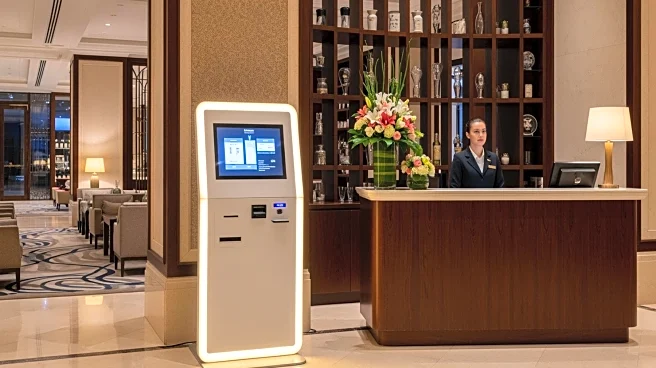What's Happening?
Felipe Ríos Romo, CEO and Founder of Beyond Hospitality Business, shares insights from his extensive career in the hospitality industry, emphasizing the importance of integrating technology with human-centered
service. Having started his career at a young age in his family's bed and breakfast, Ríos Romo has witnessed the industry's evolution from manual operations to digital transformation. He advocates for a balanced approach where technology enhances operations without compromising the personal touch that defines hospitality. Ríos Romo highlights the need for strategic technology adoption that prioritizes real value creation and maintains guest satisfaction alongside financial performance. He also discusses the impact of online travel agencies and home-sharing platforms on traditional hotels, suggesting strategies for maintaining direct relationships with guests.
Why It's Important?
The insights shared by Felipe Ríos Romo are significant for the hospitality industry as it navigates the challenges of digital transformation. His emphasis on maintaining the human element in service is crucial for preserving guest loyalty and satisfaction, which are key drivers of success in hospitality. As technology continues to reshape operations, hotels must find ways to leverage these tools effectively without losing the essence of personal service. This balance is vital for sustaining competitive advantage in a market increasingly influenced by intermediaries like OTAs and platforms like Airbnb. Ríos Romo's perspective offers valuable guidance for hoteliers seeking to adapt to technological advancements while ensuring a strong return on investment and fostering team development.
What's Next?
As the hospitality industry continues to evolve, hoteliers will need to focus on strategic technology adoption that enhances guest experiences and operational efficiency. This involves careful analysis of new systems to ensure they provide genuine benefits without undermining the human touch. Hotels may increasingly invest in CRM and guest relationship technologies powered by AI to personalize services and anticipate guest needs. Additionally, traditional hotels will need to craft strategies to compete with OTAs and home-sharing platforms, potentially by strengthening brand recognition and direct booking channels. The industry will likely see a continued emphasis on balancing high-tech solutions with high-touch service to achieve optimal guest satisfaction and financial performance.
Beyond the Headlines
The integration of technology in hospitality raises ethical considerations regarding job displacement and the preservation of human interaction. As automation and AI become more prevalent, the industry must address the potential loss of jobs traditionally performed by people. Ensuring that technology serves as an empowering tool rather than a replacement for human roles is crucial for maintaining the industry's integrity. Furthermore, the shift towards digital solutions may influence cultural aspects of hospitality, as the personal touch and tradition are integral to guest experiences. Hoteliers must navigate these changes thoughtfully to uphold the values that define hospitality while embracing innovation.








